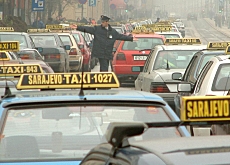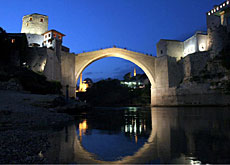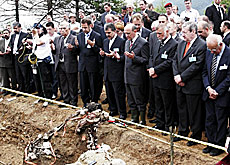Conference hails “landmark” day for Bosnia

Participants at a Swiss-supported conference on Bosnia have welcomed the European Commission's decision to start possible membership talks with the country.
The two-day conference, which wrapped up on Friday, was being held in Geneva to discuss the future of Bosnia-Herzegovina.
The European Commission announced on Friday that it had recommended the start of long-delayed talks on closer ties between the EU and Bosnia.
Bosnia is the only country in the Balkans which has not yet started Stabilisation and Association Agreement (SAA) talks – a major first step in the EU integration process.
The move still has to be approved by the EU’s 25 member states.
Delegates at the international conference in Geneva, which was being held under the banner “Ten Years of Dayton and Beyond”, said they were pleased by the decision.
In 1995 the Dayton peace agreement signalled the end of a four-year conflict in Bosnia in which an estimated 100,000 people died and two million became refugees.
Landmark
Speaking at the end of the conference, the United Nations High Representative in Sarajevo, Paddy Ashdown, called the EU’s move a “landmark decision”.
He added that a threshold had been breached which many had thought to be impossible.
Christophe Solioz, the head of the Association Bosnia and Herzegovina and one of the conference’s organisers, said that the news could not come “at a more opportune moment” and that it signalled “the end of the Dayton era”.
The conference, which was attended by more than 300 people, was opened by the Swiss foreign minister Micheline Calmy-Rey on Thursday.
One of the main topics discussed was reforms.
Participants said on Friday that it would be an enormous task for Bosnia to reach the standards needed to join the EU.
“We have a lot of work ahead of us,” said Osman Topcagic, the representative of the Sarajevo government attending the meeting.
Cooperation
The EU says that it is aware of this. A statement from the Commission on Friday said that while Bosnia had made great progress in some reforms, it had to continue improving cooperation with the International Criminal Tribunal for the former Yugoslavia.
Failure by the Bosnian Serb authorities to detain their wartime leader Radovan Karadzic has long prevented the EU from agreeing closer ties to the country, say observers.
“When Radovan Karadzic is at [the International Criminal Tribunal at] The Hague all the reform processes will more forward more rapidly,” said Ashdown, adding that more cooperation was needed from the Bosnian Serb authorities.
Bosnia also needs to adopt laws on public broadcasting and to ensure that reforms go through to end the ethnic division of the police force, said the commission.
“Lack of progress in these areas may delay the opening of SAA negotiations, or lead to their suspension,” it said.
Commitment
Switzerland has a long-standing commitment to Bosnia, which has benefited from almost SFr400 million ($309 million) in Swiss aid since 1996.
The country has also covered a third of the costs of the conference – donating SFr150,000.
In her speech to the conference on Thursday, Calmy-Rey said that Bosnia was at a “turning point” and that its future lay in Europe.
“Our vision for Bosnia-Herzegovina is that of a country as part of a peaceful, democratic and prosperous region, fully integrated in Europe, which is where – without doubt – it belongs,” she said.
swissinfo with agencies
Since 1992 Bosnia-Herzegovina has been an independent country, member of the UN and other international organisations.
Since the Dayton Accords in 1995, Bosnia has been administered in a supervisory role by a High Representative selected by the UN Security Council.
It has a population of around 4 million.
40 per cent are unemployed and nearly 20 per cent live below the poverty level.
Bosnia has benefited from almost SFr400 million ($309 million) in Swiss aid since 1996.
The European Commission’s recommendation to start Stabilisation and Association Agreement (SAA) talks with Bosnia coincided with the end of an international conference on Bosnia, which took place in Geneva.
The two-day conference was supported by Switzerland.

In compliance with the JTI standards
More: SWI swissinfo.ch certified by the Journalism Trust Initiative


You can find an overview of ongoing debates with our journalists here. Please join us!
If you want to start a conversation about a topic raised in this article or want to report factual errors, email us at english@swissinfo.ch.